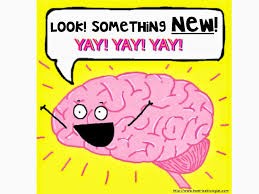
With the festive season comes Black Friday on 29th November, where shops offer huge discounts that send us into a spending frenzy. But what can neuroscience tell us about the brain when we lose control?
By Dr Samantha J. Brooks Ph.D.

Modern society immerses us in visions of continuous temptation (brain elixirs for eternal youth, longevity, power: food, sex, status symbols) that are difficult to ignore. These temptations are even more alluring during the festive season, when we are all permitted – and even expected – to stop working and enjoy ourselves! Shops fronts, billboards, newspapers, TV and the internet bombard us with enticing special offers and exciting rewards that grab our attention and make us forget about our more sensible long term goals. We are easily tempted to forget that we don’t have endless amouts of money to spend, and we may easily swipe our credit card when we temporarily bond with the friendly, smiling check-out assistant who asks us to hand over our cash. It is only later, when the exciting lights, music and bargains of the shopping mall have ceased – and we are back in the familiar surroundings of home – that we regain our sense of composure. How does this acute loss of control over our spending behaviour happen so readily, and so quickly, to so many people, during the festive season? And how can we try to improve our self-control, so that we don’t start the new year with heavy debts to pay off?

Eva Ritvo M.D., writing for Psychology Today, coins the term ‘trifecta of neurotransmitters’ that infect the way our brain functions on Black Friday. These 3 neurotransmitters are: dopamine (reward/pleasure), serotonin (happiness) and oxytocin (bonding, social connection). These neurotransmitters gain even further traction over our brain’s functioning if we are already in a state of mental overload and anxiety – so many things to buy, so many crowds, so little time and money left before the holidays! When our prefrontal cortex is overloaded with thoughts in this way, the dopamine released in the middle part of the brain takes over our behaviour and increases our craving and impulsivity, and reducing our anxiety. This is particularly true when we are anticipating buying something we like (it is no coincidence that shops start advertising their Black Friday deals early – to give the brain the expectation it craves). What’s more, is that the dopamine build-up is especially sensitive if our peers and other people we value have – or want – these products too. Furthermore, our brains derive the most dopamine release from novelty – new bargains, new products, new stimulating advertisements. And more interesting still – if something is novel and it’s high value has been temporarily slashed – which is what happens on Black Friday, then we don’t have to work so hard to obtain that valuable item! And our brains are wired to find ways to get the most value for the least amount of work – and when Black Friday provides this for us, our brains become drenched in dopamine!

The second of the trifecta, serotonin, is associated with good mood and motivation – conversely people with low motivation and who feel depressed have diminished levels of serotonin in their brains. Interestingly, the precursor to serotonin – tryptophan – is not produced by our bodies but from essential amino acids in our food. So it is no coincidence that after a few hours of motivated, frenzied shopping on Black Friday, we might be left feeling tired and hungry! Cue the takeaway outlets that offer enticing, cheap, fast meals while we shop! And so keeping us motivated to seek bargains, to follow the advertising trails that lure us to various shops, maintains the surge of serotonin in our brain circuitry.

Finally, oxytocin is a hormone produced in the hypothalamus – a brain area associated with hunger and stress, among other homeostatic (balancing) systems in the body and brain. Oxytocin is released when we fall in love, when we have sex, and in the baby and mother when a baby breastfeeds. It is often termed ‘the bonding hormone’, which connects us socially to others. As such, it is interesting to consider that oxytocin is released into the brain when we impulsively search for bargains on Black Friday. But this is partly due to oxytocin’s ability to make us feel calmer. Buying a bargain is a form of ‘self-medicating’, especially if we were previously feeling stressed. Oxytocin is an antidote to stress and anxiety – and could be one route into a sense of loss-of-control and craving the next spend. Women in particular may gain a sense of providing for their loved ones when buying bargains over the festive period – a proxy bonding ritual for the modern age.

With knowledge of some of the brain processes underlying our impulsive spending during Black Friday – what can be done to help us improve our brain’s ability to foster self-control and will-power? Some neuroscientists argue that it is possible to strengthen the neural pathways (white matter tracts) between the prefrontal cortex and the dopamine-releasing reward areas in the middle of the brain to improve our self-control. It is possible to do this for example, by exercising one’s working memory – a process that involves repetitively keeping in mind some thoughts while avoiding stimulating distractions (there are many free online working memory games to play). It is known that during periods of excessive spending and impulsive shopping, our working memory is hardly functioning at all. And so by practising our working memory ability at home may well help us to make better choices in the shops on Black Friday. And it may also help us to keep a few more Rands in our pockets for the New Year!
Dr Samantha Brooks is a UK neuroscientist in Harfield Village, specialising in the neural correlates of impulse control from eating disorders to addiction. For more information you can contact Samantha at: www.drsamanthabrooks.com.
Click to read all previous articles by Dr Samantha J. Brooks Ph.D.

44 Second Avenue, Harfield Village | 021 674 1120 | info@harfield-village.co.za
© 2023 Harfield Village Online – Maintained by Vooma VA